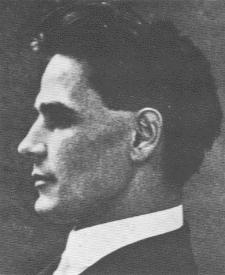
Wednesday, February the 13th, 2013
back to: title, date or indexes
From the archives, this postage first appeared seven years ago today, on 13 February 2006:

Almost exactly two years ago, on 13 March 2004 to be precise, our quote of the day was by William Hope Hodgson, from From The Tideless Sea. To jog your memories, he wrote
I am writing this in the saloon of the sailing ship, Homebird, and writing with but little hope of human eye ever seeing that which I write; for we are in the heart of the dread Sargasso Sea—the Tideless Sea of the North Atlantic. From the stump of our mizzen mast, one may see, spread out to the far horizon, an interminable waste of weed—a treacherous, silent vastitude of slime and hideousness!
When I chose the quotation I was unfamiliar with the work of Hodgson, a state of affairs which continued, shamefully, until just a few days ago. I am indebted to Tim Gadd for drawing my attention to this superb writer and encouraging me to immerse myself in the slimy, weed-choked pages of his books.
William Hope Hodgson (1877–1918) was an author, photographer, sailor, and body-builder, who wrote four novels before concentrating on short fiction. He was killed in the First World War. H. P. Lovecraft was an admirer, praising his “serious treatment of unreality,” and the critic Sam Gafford notes “his apparently inexplicable choice of writing styles” in an essay entitled Writing Backwards.
Reading his first published novel, The Boats Of The ‘Glen Carrig’, I was struck by something else ‘apparently inexplicable’. The story purports to be
an account of [the boats'] Adventures in the Strange places of the Earth, after the foundering of the good ship ‘Glen Carrig’ through striking upon a hidden rock in the unknown seas to the Southward, As told by John Winterstraw, Gent., to his son James Winterstraw, in the year 1757, and by him committed very properly and legibly to manuscript
so what we get is a thrilling yarn wherein the narrator recounts coming ashore in the Land of Lonesomeness. . .
we found it to be of an abominable flatness, desolate beyond all that I could have imagined… in the end, we found… a slimy-banked creek… the banks being composed of a vile mud
. . . before heading off to an island on a weed-choked sea where the bulk of the tale takes place. As in From The Tideless Sea, the setting is thus an interminable waste of weed—a treacherous, silent vastitude of slime and hideousness!
Lurking in the weeds are various disgusting creatures which our heroes fight off and outwit, in between doing boat repairs. But is there any other writer who would take pains to mention every single occasion his characters break off for a meal? Until the end, where several weeks' action is summarised, the narrative takes us day by day, and Hodgson regularly reassures us that the castaways are getting proper meals.
I did some basic word-count analysis on the novel, and Hodgson's focus of attention became clear. It is indeed a weed-choked book—weed, and enticing variants such as the weed-continent, appear 223 times (in a 60,000-word text). Considering that our narrator and his curiously anonymous pals spend much time in terror of the various disgusting creatures I mentioned, it is no surprise to find hideous, monsters, and tentacles accounting for a total of 51 words. Yet breakfast, dinner, and food win the day with 53. And as it seems de rigueur to have a puff after every meal, smoke is mentioned 15 times.
I have just begun reading Hodgson's second novel, The House On The Borderland, and sure enough, by page three,
Tonnison had got the stove lit now and was busy cutting slices of bacon into the frying pan.
I hope an enterprising publisher reissues Hodgson's works, if one has not already done so, but I would dearly like to see The William Hope Hodgson Recipe Book, a boon for any picnic-person in a silent vastitude of slime and hideousness!
Hooting Yard on the Air, February the 14th, 2013 : “Vile Mud And Weeds” (starts around 00:02)